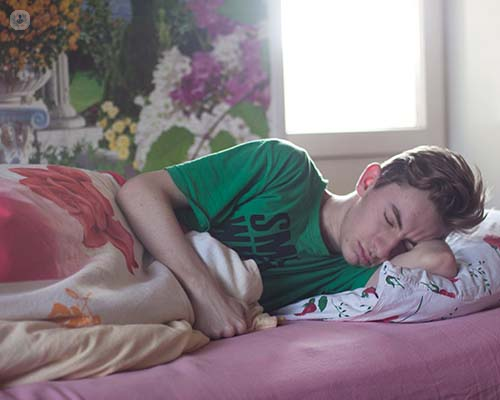Gastroparesis: why do I feel full and nauseous when I eat?
Written by:Gastroparesis is a condition characterised by the impaired functioning of the stomach muscles. Normally, your stomach muscles contract and move food through your digestive tract. In gastroparesis, the stomach muscles are inefficient or do not function at all, preventing your stomach from emptying its contents into the small intestine.
We’ve asked expert gastroenterologist Dr Aathavan Loganayagam to explain the symptoms of the stomach disease, how it’s diagnosed by a specialist and the treatment options available.

What are the symptoms of gastroparesis?
One of the common symptoms is heartburn akin to symptoms of gastroesophageal reflux disease, which are aggravated with the intake of high fibre foods. They may include:
- upper abdominal pain
- nausea
- vomiting
- a rapid feeling of fullness after taking only a small part of the meal
- loss of appetite
- loss of weight
- abdominal bloating
- fluctuating blood sugar levels
What causes gastroparesis?
Though unclear, gastroparesis is believed to be caused by damage to the vagus nerve, which controls the stomach muscles. The vagus nerve can be damaged by surgery to the stomach or small intestine, or from diseases such as diabetes.
Without signals from the vagus nerve, the stomach muscles do not function and retain food in the stomach. Other factors that can affect proper stomach emptying include viral infection, certain drugs such as narcotics and antidepressants, eating disorders, scleroderma, Parkinson’s disease and hypothyroidism.
How does a specialist diagnose gastroparesis?
Diagnosis is preceded by a detailed history and physical examination. Complete blood counts and blood biochemistry including chemical and electrolyte levels are next checked.
Imaging tests such as upper gastrointestinal endoscopy are performed to check for obstruction. This involves passing a long thin tube called an endoscope down to the oesophagus. The camera on the tip of the tube shows the pictures of the inner walls of the stomach and gut.
Gastric emptying scintigraphy is yet another test that shows the rate of emptying of the stomach. This test involves eating a bland meal that contains a small amount of a radioactive substance, called radioisotope. The dose of radiation from the radioisotope is not dangerous.
After the meal scans are taken at 1, 2, 3, and 4 hours. The radioisotope shows up the emptying of the stomach. When more than 10% of the meal is still in the stomach at 4 hours, the diagnosis of gastroparesis is confirmed.
After ingestion of a meal with an isotope, breath samples are taken to measure the presence of the isotope in carbon dioxide. The results reveal the rate of emptying of the stomach.
How is gastroparesis treated?
Treatment involves identifying and treating the underlying condition. Your doctor will work with you to manage conditions such as diabetes. You will be advised to make changes to your diet by including food that is easier for you to digest. You may be prescribed medications to control nausea and vomiting and/or to stimulate your stomach muscles.
Your doctor may recommend a feeding tube (jejunostomy tube) that can be inserted into your mouth, nose or abdomen (directly into your small intestine). Surgery may be recommended if all other treatments fail. Surgery involves stapling or bypassing the lower part of your stomach to help improve stomach emptying.
If you are experiencing stomach problems when eating, do not hesitate to book an appointment with Dr Loganayagam for a first consultation.


